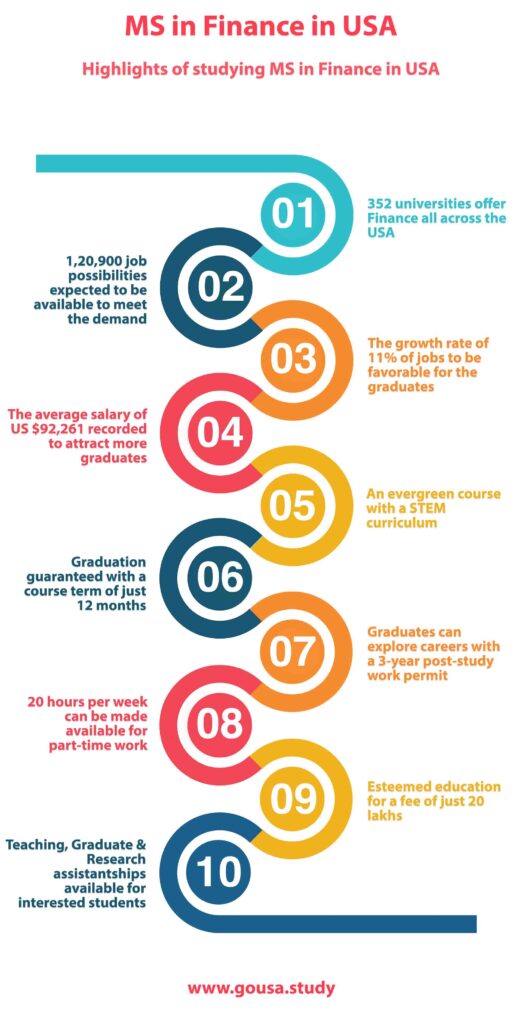To pursue admission for a Master of Science in Finance (MSF) program in the United States, follow these general steps:
- Research Programs:
Explore MSF programs offered by various universities in the US. Consider factors such as curriculum, faculty expertise, resources, location, and reputation. You can find information about programs on university websites, rankings, and review platforms.
- Check Admission Requirements:
Review the admission criteria for each program you’re interested in. Typical requirements may include a bachelor’s degree from an accredited institution, satisfactory undergraduate GPA, standardized test scores (such as the GMAT or GRE), letters of recommendation, resume/CV, statement of purpose, and English language proficiency (for international students).
- Prepare Application Materials:
Gather all required application materials and prepare them according to each program’s specifications. This may involve writing essays or personal statements, obtaining letters of recommendation, and taking standardized tests if required.
- Submit Applications:
Complete and submit your applications by the specified deadlines. Make sure to double-check all application materials for accuracy and completeness before submission. Pay attention to application deadlines as they may vary by program.
- Interview (if required):
Some MSF programs may require applicants to participate in an admissions interview. Prepare for interviews by researching the program, practicing common interview questions, and highlighting your qualifications and experiences.
- Wait for Admission Decisions:
After submitting your applications, wait for admission decisions from the universities. This process may take several weeks to months, depending on the program’s timeline. Stay informed about any updates or requests from the admissions offices.
- Acceptance and Enrollment:
If you receive admission offers from multiple programs, carefully consider your options before making a decision. Once you’ve chosen a program, follow the enrollment instructions provided by the university to secure your spot in the MSF program.
Now, let’s discuss the benefits of earning a Master of Science in Finance (MSF) degree and why you might choose this course:

Career Opportunities:
MSF graduates have access to a wide range of career opportunities in finance and related fields. Some common job roles include:
- Financial Analyst
- Investment Analyst/Associate
- Portfolio Manager
- Risk Manager
- Financial Manager
- Corporate Treasurer
- Investment Banker
- Private Equity Associate
- Hedge Fund Analyst
- Financial Consultant
Master of Science in Finance (MSF) Degree Benefits:
- Advanced Knowledge:
Gain advanced knowledge and skills in finance, including financial analysis, investment management, risk assessment, and corporate finance.
- Career Advancement:
Enhance your career prospects and earning potential in the finance industry. MSF graduates are well-equipped for roles in finance, banking, consulting, and related fields.
- Specialization Opportunities:
Customize your degree by focusing on specific areas of finance that align with your interests and career goals, such as financial modeling, quantitative finance, or sustainable finance.
- Networking:
Build a strong professional network through interactions with faculty, industry professionals, and fellow students. Networking opportunities can lead to internships, job placements, and career advancement.
- Professional Certifications:
Prepare for professional certifications such as the Chartered Financial Analyst (CFA) designation, which can enhance your credentials and credibility in the finance industry.
Best Colleges Offering Master of Science in Finance (MSF) Programs
Some of the top universities in the US offering MSF programs include:
- Massachusetts Institute of Technology (MIT)
- University of Pennsylvania (Wharton)
- University of Chicago (Booth)
- Stanford University
- Harvard University
- New York University (Stern)
- Columbia University
- University of California, Berkeley (Haas)
- University of Michigan (Ross)
- University of Texas at Austin (McCombs)
Read More : MBA information
Job Companies
MSF graduates may find employment opportunities in various types of companies, including:
- Investment Banks (e.g., Goldman Sachs, JPMorgan Chase)
- Asset Management Firms (e.g., BlackRock, Vanguard)
- Hedge Funds (e.g., Bridgewater Associates, Citadel)
- Consulting Firms (e.g., McKinsey & Company, Bain & Company)
- Corporate Finance Departments (e.g., Microsoft, Apple)
- Financial Services Companies (e.g., American Express, Visa)
- Insurance Companies (e.g., AIG, Prudential Financial)
- Government Agencies (e.g., Federal Reserve, Securities and Exchange Commission)
- Nonprofit Organizations (e.g., World Bank, International Monetary Fund)
- Fintech Startups (e.g., Stripe, Robinhood)
These companies offer diverse opportunities for MSF graduates to apply their knowledge and skills in finance across different sectors and industries.
Note – This article is only educational purpose. we can’t offer or recommend any courses or degrees.
Read More : Best 10 SUV Cars in the United States


